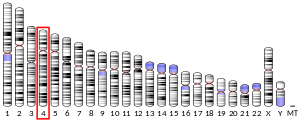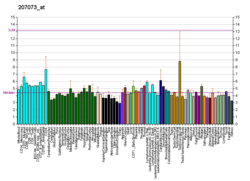CDKL2
Cyclin-dependent kinase-like 2 is an enzyme that in humans is encoded by the CDKL2 gene.[5][6]
This gene product is a member of a large family of CDC2-related serine/threonine protein kinases. It accumulates primarily in the cytoplasm, with lower levels in the nucleus.[6]
References
- 1 2 3 GRCh38: Ensembl release 89: ENSG00000138769 - Ensembl, May 2017
- 1 2 3 GRCm38: Ensembl release 89: ENSMUSG00000029403 - Ensembl, May 2017
- ↑ "Human PubMed Reference:".
- ↑ "Mouse PubMed Reference:".
- ↑ Taglienti CA, Wysk M, Davis RJ (Feb 1997). "Molecular cloning of the epidermal growth factor-stimulated protein kinase p56 KKIAMRE". Oncogene. 13 (12): 2563–74. PMID 9000130.
- 1 2 "Entrez Gene: CDKL2 cyclin-dependent kinase-like 2 (CDC2-related kinase)".
External links
- Human CDKL2 genome location and CDKL2 gene details page in the UCSC Genome Browser.
Further reading
- Marracci GH, Marquardt WE, Strehlow A, et al. (2006). "Lipoic acid downmodulates CD4 from human T lymphocytes by dissociation of p56(Lck)". Biochem. Biophys. Res. Commun. 344 (3): 963–971. doi:10.1016/j.bbrc.2006.03.172. PMID 16631599.
- Sarkar SN, Peters KL, Elco CP, et al. (2004). "Novel roles of TLR3 tyrosine phosphorylation and PI3 kinase in double-stranded RNA signaling". Nat. Struct. Mol. Biol. 11 (11): 1060–1067. doi:10.1038/nsmb847. PMID 15502848.
- Tao J, Van Esch H, Hagedorn-Greiwe M, et al. (2005). "Mutations in the X-linked cyclin-dependent kinase-like 5 (CDKL5/STK9) gene are associated with severe neurodevelopmental retardation". Am. J. Hum. Genet. 75 (6): 1149–1154. doi:10.1086/426460. PMC 1182152. PMID 15499549.
- Gerhard DS, Wagner L, Feingold EA, et al. (2004). "The status, quality, and expansion of the NIH full-length cDNA project: the Mammalian Gene Collection (MGC)". Genome Res. 14 (10B): 2121–2127. doi:10.1101/gr.2596504. PMC 528928. PMID 15489334.
- Strausberg RL, Feingold EA, Grouse LH, et al. (2003). "Generation and initial analysis of more than 15,000 full-length human and mouse cDNA sequences". Proc. Natl. Acad. Sci. U.S.A. 99 (26): 16899–16903. doi:10.1073/pnas.242603899. PMC 139241. PMID 12477932.
- "Toward a complete human genome sequence". Genome Res. 8 (11): 1097–108. 1999. doi:10.1101/gr.8.11.1097. PMID 9847074.
- Marcilla A, Rivero-Lezcano OM, Agarwal A, Robbins KC (1995). "Identification of the major tyrosine kinase substrate in signaling complexes formed after engagement of Fc gamma receptors". J. Biol. Chem. 270 (16): 9115–9120. doi:10.1074/jbc.270.16.9115. PMID 7721825.
This article is issued from
Wikipedia.
The text is licensed under Creative Commons - Attribution - Sharealike.
Additional terms may apply for the media files.




